Introduction to Strategic Alliances in Agriculture
Strategic alliances significantly enhance modern agriculture.
These partnerships unite resources for mutual benefit.
Consequently, they allow organizations to meet market demands effectively.
Farms partner with technology companies and research institutions.
These collaborations drive innovation in sustainable practices.
The Role of Technology in Strategic Alliances
Technology plays a vital role in modern agriculture.
Partners adopt precision agriculture techniques for enhanced efficiency.
For example, drone technology improves crop monitoring.
Additionally, data analytics optimizes resource allocation.
Such technology enhances productivity and sustainability.
Environmental Benefits of Collaborations
Strategic alliances foster environmentally friendly practices.
These partnerships promote the use of organic inputs.
For instance, companies like EcoFarms collaborate with local growers.
They encourage sustainable pest management strategies.
Such practices reduce chemical use while maintaining crop yields.
Transform Your Agribusiness
Unlock your farm's potential with expert advice tailored to your needs. Get actionable steps that drive real results.
Get StartedMarket Expansion through Alliances
Alliances provide opportunities for market growth.
Businesses can expand their reach into new regions.
Joint ventures enable shared marketing efforts and resources.
For example, Fresh Fields collaborates with local farmers.
The partnership improves product distribution channels.
Challenges to Forming Alliances
Despite the benefits, challenges exist in creating alliances.
Different organizational cultures can pose difficulties.
Moreover, aligning goals and expectations takes effort.
Parties must communicate clearly to prevent misunderstandings.
Addressing these challenges is crucial for successful partnerships.
The Importance of Sustainability in Modern Agriculture
Boosting Soil Health
Sustainable agriculture plays a crucial role in boosting soil health.
Healthy soil contributes to increased crop yields and resilient farming systems.
It enhances nutrient retention and promotes beneficial microorganisms.
Furthermore, practices such as crop rotation and cover cropping restore the soil’s natural structure.
Mitigating Climate Change
Modern sustainable practices help mitigate climate change.
They reduce greenhouse gas emissions associated with conventional farming.
In addition, sustainable methods promote carbon sequestration in soil.
This process helps to absorb atmospheric carbon dioxide effectively.
Conserving Water Resources
Water conservation is critical in sustainable agriculture.
Efficient irrigation practices save significant amounts of water.
Moreover, techniques such as rainwater harvesting capture and reuse water effectively.
This not only conserves water but also reduces pollution from runoff.
Promoting Biodiversity
Sustainable agriculture promotes biodiversity in farming systems.
Diverse ecosystems support a variety of crops and livestock.
Showcase Your Farming Business
Publish your professional farming services profile on our blog for a one-time fee of $200 and reach a dedicated audience of farmers and agribusiness owners.
Publish Your ProfileThis variety boosts resilience against pests and diseases.
It also improves pollination and enhances the overall ecosystem health.
Supporting Local Economies
Emphasizing local production and consumption helps sustain local economies.
Sustainable agriculture often relies on small-scale farmers.
These farmers contribute to community vitality and local job creation.
They also reduce transportation costs and carbon footprints.
Ensuring Food Security
Sustainable practices contribute to long-term food security.
They focus on producing food that is nutritious and abundant.
Moreover, they bolster food production in a way that considers future generations.
This approach addresses both current and anticipated food demands effectively.
Types of Strategic Alliances
Collaborations
Collaborations enable farmers to share resources and knowledge.
They often involve informal agreements between various stakeholders.
For instance, local farmers might collaborate on research projects.
Such partnerships can enhance crop yield and sustainability.
Additionally, collaborations may extend to technology transfers.
Research institutions often play a key role in these alliances.
They provide valuable insights and data for better practices.
Partnerships
Partnerships typically involve more formal agreements.
They exist between two or more parties with aligned goals.
For example, a seed company may partner with local farmers.
This arrangement supports innovative seed technology deployment.
Both parties benefit from shared marketing and distribution channels.
Such strategic alliances can bolster financial stability.
They also enhance risk management practices in agriculture.
Joint Ventures
Joint ventures create entirely new entities for specific objectives.
These ventures allow for shared investment and risk in projects.
An example includes a cooperative between irrigation technology firms.
Farmers and tech firms work together to develop advanced systems.
This alliance leads to improved water management practices.
Moreover, joint ventures can offer access to new markets.
They promote innovation by combining diverse expertise and resources.
Gain More Insights: Understanding Global Supply Chains in Agribusiness
Case Studies: Successful Strategic Alliances in Sustainable Agriculture
Collaboration Between GreenGrow and EcoFarms
GreenGrow partnered with EcoFarms to enhance organic production.
This collaboration improved crop yields while reducing waste.
They shared resources to implement vertical farming techniques.
As a result, both companies positioned themselves as industry leaders.
The Alliance of AgroTech and BioYield
AgroTech joined forces with BioYield to develop sustainable pest management solutions.
Their innovative approach reduced pesticide use by 40%.
Additionally, they achieved improved soil health across several farms.
This alliance showcased the benefits of biotech in organic farming.
Showcase Your Farming Business
Publish your professional farming services profile on our blog for a one-time fee of $200 and reach a dedicated audience of farmers and agribusiness owners.
Publish Your ProfileFarmers United and Local Produce Network
Farmers United teamed up with the Local Produce Network to boost local markets.
The alliance increased sales for small farmers by promoting organic offerings.
Moreover, it fostered community engagement in sustainable practices.
This partnership demonstrated the importance of local collaboration.
Green Roots and Renewable Energy Solutions
Green Roots collaborated with Renewable Energy Solutions to install solar panels on farms.
This initiative significantly reduced energy costs for farmers.
Furthermore, it encouraged the use of renewable energy in agriculture.
The partnership benefitted both the environment and the farmers’ bottom line.
Impact of Strategic Alliances on Sustainable Practices
These alliances illustrate how collaboration drives sustainable agriculture forward.
They enable knowledge sharing and resource optimization.
Moreover, such partnerships amplify impact by reaching diverse stakeholders.
Ultimately, strategic alliances can lead to a greener agricultural future.
You Might Also Like: Essential Steps for Successful Farm Succession
Benefits of Strategic Alliances for Farmers and Producers
Access to Resources
Strategic alliances provide farmers with access to shared resources.
This includes equipment, technologies, and knowledge.
Farmers can leverage these resources to increase productivity.
Moreover, this shared access reduces individual costs.
Overall, it boosts the operational efficiency of farms.
Enhanced Market Access
Alliances open doors to new markets and customers.
Farmers can reach a broader audience through joint efforts.
Collaborative marketing strategies strengthen brand presence.
This approach creates mutually beneficial opportunities to thrive.
Ultimately, strategic partnerships enhance competitive advantage.
Risk Mitigation
Strategic alliances help distribute risks among partners.
This reduces the financial burden during challenging periods.
Farms can collaborate on crop diversification strategies.
Such diversity protects against market fluctuations.
In addition, shared knowledge helps address unexpected challenges.
Innovation and Knowledge Sharing
Alliances enhance innovation through collaborative efforts.
Farmers can share best practices and innovative methods.
This fosters a culture of continuous improvement and learning.
Implementing new technologies becomes easier through teamwork.
Ultimately, this leads to sustainable agricultural practices.
Community Building
Strategic alliances foster stronger community ties among farmers.
They provide a platform for networking and support.
This sense of community encourages information exchange.
Moreover, collective action can address local challenges.
Together, farmers can advocate for policies that benefit agriculture.
Explore Further: SEO Tips for Agribusiness E-commerce Sites

Challenges Faced in Forming Strategic Alliances
Understanding Diverse Goals
Each partner often has distinct goals and priorities.
Showcase Your Farming Business
Publish your professional farming services profile on our blog for a one-time fee of $200 and reach a dedicated audience of farmers and agribusiness owners.
Publish Your ProfileThis diversity can lead to misunderstandings and conflicts.
Aligning these goals helps establish a unified vision.
Communication is essential to navigate these differences.
Regular discussions foster transparency among partners.
Navigating Legal and Financial Complexities
Each alliance entails a variety of legal obligations.
Establishing clear contracts is crucial to success.
Financial arrangements often complicate partnerships as well.
Partners must agree on cost-sharing and profit distribution.
Legal counsel can help in drafting and reviewing agreements.
Building Trust Among Partners
Trust serves as the foundation of any successful alliance.
Without trust, collaboration becomes challenging.
Past experiences influence partners’ willingness to trust one another.
Regular interactions can enhance mutual trust over time.
Setting up joint projects can demonstrate commitment.
Overcoming Cultural Differences
Cultural variances can impact communication styles and decision-making.
Recognizing these differences is the first step toward integration.
Education and awareness can bridge cultural gaps.
All partners benefit from mutual respect and understanding.
Team-building activities encourage camaraderie and cooperation.
Addressing Environmental Regulations
Each region presents unique regulatory challenges for agriculture.
Navigating these regulations can be complex and time-consuming.
All partners must be informed about relevant policies.
Compliance ensures the sustainability of agricultural practices.
Regular reviews of legal obligations promote adherence.
Gain More Insights: Cloud Computing Applications in Modern Farming
The Role of Technology in Facilitating Strategic Alliances
Enhancing Communication
Technology plays a crucial role in enhancing communication within agricultural alliances.
It connects farmers, suppliers, and consumers seamlessly.
Moreover, real-time data sharing improves decision-making processes.
As a result, stakeholders can respond swiftly to market changes.
Facilitating Data Management
Advanced data management systems simplify information handling for agricultural partners.
Farmers can track yield, soil health, and pest management easily.
Additionally, these systems enable better resource allocation and planning.
This leads to increased productivity across collaborative farming efforts.
Promoting Innovation
Technology encourages innovation in sustainable agricultural practices.
For instance, collaborative software enables joint research and development.
This leads to the creation of sustainable farming solutions tailored to specific regions.
Consequently, alliances benefit from shared insights and expertise.
Streamlining Supply Chain Management
Technology enhances supply chain efficiency in agricultural alliances.
Automated systems track product movement from farm to market effectively.
This ensures timely deliveries and reduces waste significantly.
Showcase Your Farming Business
Publish your professional farming services profile on our blog for a one-time fee of $200 and reach a dedicated audience of farmers and agribusiness owners.
Publish Your ProfileThus, partners can maintain consistent quality and profitability.
Building Sustainable Relationships
Strategic alliances leverage technology to build sustainable relationships.
Digital platforms facilitate networking among interested parties in agriculture.
As a result, stakeholders can identify mutual goals and collaborate effectively.
This fosters trust and long-term partnerships that drive sustainability.
Expanding Market Access
Technological advancements allow smallholder farmers access to larger markets.
Online marketplaces connect them directly with consumers and retailers.
This reduces dependency on middlemen and increases profit margins.
Consequently, it empowers farmers to expand their operations sustainably.
Future Trends: How Strategic Alliances Can Innovate Sustainable Agriculture
Overview of Strategic Alliances
Strategic alliances foster collaboration among diverse agricultural players.
These partnerships often combine resources and expertise for greater impact.
For instance, farmers can team up with technology firms to enhance crop yield.
Moreover, collaborations can lead to shared practices that promote sustainability.
Advancements in Technology through Alliances
Alliances can drive innovation in agricultural technologies.
Organizations like GreenTech Solutions develop precision farming tools.
In partnership with local farmers, they test new technologies in real settings.
Consequently, these advancements often translate into data-driven farming practices.
Also, alliances help in scaling successful innovations across regions.
Enhancing Resource Management
Strategic partnerships can significantly improve resource management.
For example, farmers may collaborate with water conservation groups.
These collaborations often lead to more efficient irrigation techniques.
As a result, sustainable practices reduce waste while maximizing output.
Furthermore, shared knowledge about resource allocation benefits all parties involved.
Building Resilient Supply Chains
Alliances strengthen the supply chain in sustainable agriculture.
Partnerships among farmers, distributors, and retailers ensure transparency.
This transparency can lead to better pricing strategies for consumers.
Additionally, collective bargaining power allows farmers to negotiate better deals.
Such collaborations mitigate risks associated with market fluctuations.
Encouraging Sustainable Practices
Through shared initiatives, alliances promote sustainable agricultural practices.
For instance, certifications for organic practices can be shared among partners.
These accredited alliances often increase trust among consumers.
Moreover, sustainability becomes a unified goal, fostering community support.
Ultimately, such collaborations will become foundational for future agriculture models.
Influencing Policy and Advocacy
Strategic alliances can also have a significant role in policy-making.
By collaborating, various stakeholders can present a united front.
This strength in numbers can influence agricultural policy decisions.
For example, organizations may lobby for enhanced funding for sustainable practices.
Furthermore, they can advocate for regulations that favor eco-friendly farming.
Global Collaboration for Local Impact
Partnerships can extend beyond local boundaries to achieve global impact.
Organizations like Farmers Without Borders share knowledge internationally.
Showcase Your Farming Business
Publish your professional farming services profile on our blog for a one-time fee of $200 and reach a dedicated audience of farmers and agribusiness owners.
Publish Your ProfileThese alliances help local farmers adopt best practices from around the world.
As a result, global networks facilitate the exchange of innovative ideas.
This exchange can significantly enhance local agricultural practices.
Additional Resources
Public–private partnerships for agribusiness development – A review …
Bunge, Nutrien Ag Solutions Announce Strategic Alliance to …




